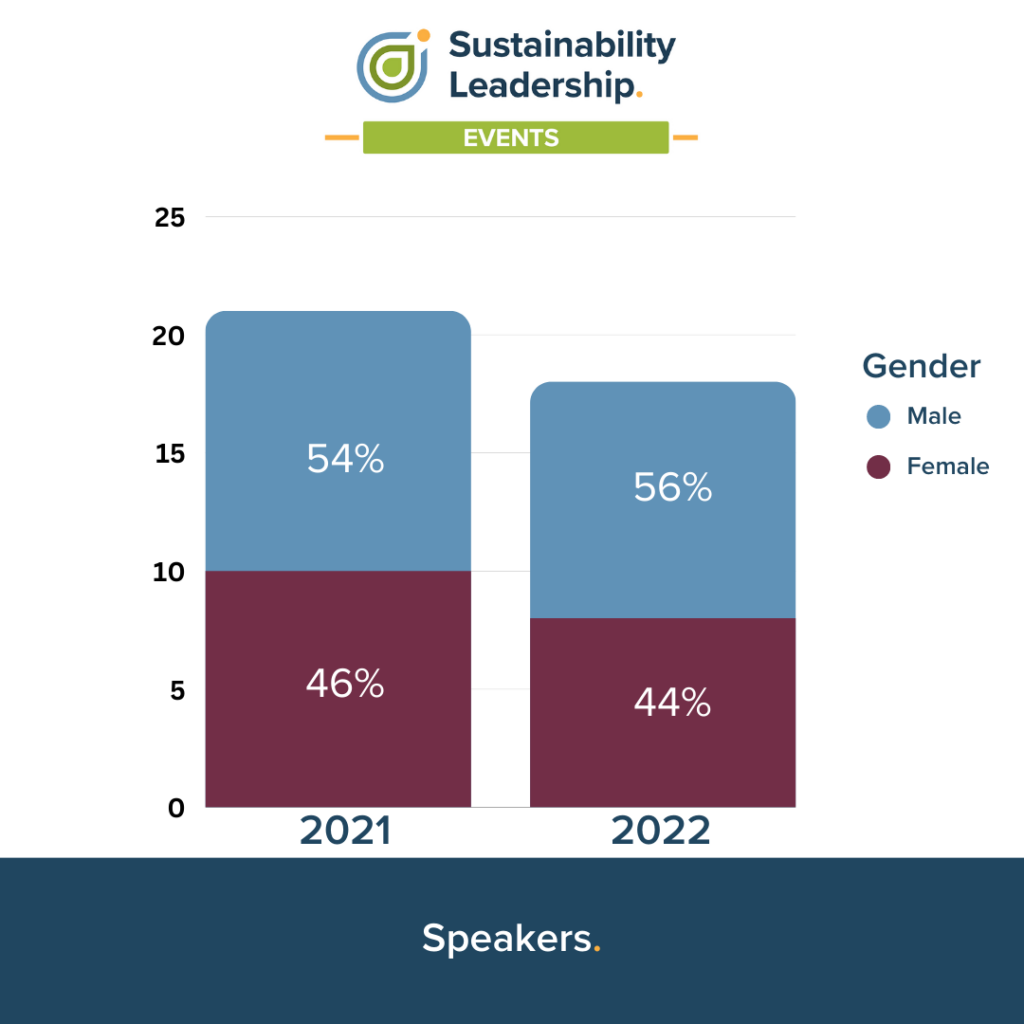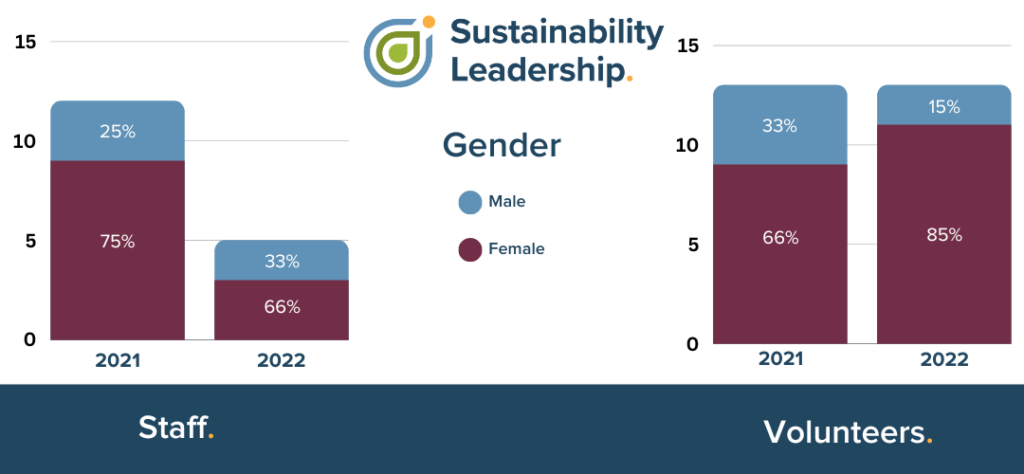Annual Impact Report 2022
Year in Review.
Year in Review.
The past year saw a lot of changes and shifts in the economic, social and environmental spaces. The population surpassed 8 billion people. Canada qualified for the World Cup, hosted in Qatar, the first time in a Middle Eastern country. And the UN vows to address the full lifecycle of plastic waste by 2024.
The beginning of 2022 put us back into a moment of hesitation with another lockdown, unsure of whether it was safe to go back to in-person activities completely. Sustainability Leadership, along with many other businesses, remained in remote operations with the occasional in-person activities. Fortunately, there were no further lockdowns in 2022 and supply chains and economic activity began to resume normal activity.
What remained consistent from the lockdowns was that small businesses were still far behind in their ability to recover as quickly as their larger counterparts. Sustainability Leadership worked with neighbouring Green Economy Hubs to close the gaps between our service areas to ensure businesses were able to find the support they needed in their recovery and sustainability journeys. Sustainability Leadership expanded to include the Peel, Brant and Brantford regions, in addition to Hamilton, Halton and Niagara regions.
Around the same time, one of the most extreme derechos formed in southern Ontario, spanning from Sarnia to Quebec City. This massive thunderstorm caused an estimated C$875 million in insured damages – one of the most costly natural disasters in Canada. Globally, the world saw the sixth warmest temperature on record, extending the streak of record highs to 8 in the last 9 years as the hottest years on record. Fortunately, renewable energy production also saw a record high, showing a positive trend for the future of green technologies.
While we can focus on the positives that have come from these circumstances, there is still much work to be done. As we look back on 2022, we can see that the decisions we have made, the changes we have implemented, the investments we have created, are building momentum.
Organisation Updates.
Events.
In 2022, we were proud to have hosted 3 events which drew in over 150 attendees, one virtual, one hybrid and one in-person. Attendees had diverse backgrounds representing over 10 industry sectors. We also welcomed 15 exhibitors and 19 speakers who explored a variety of sustainability topics helping to inform and equip local businesses with tools and strategies to advance their sustainability journeys. Our events are a significant component in building the local sustainability momentum, fostering valuable education and enabling networking opportunities.
In March, we hosted a webinar, Get Started: Practical Steps to Improving Business. We wanted to help businesses learn about how to start their sustainability journey. Attendees learned about low or no-cost areas of opportunity that can improve employee engagement, understand how small initiatives and improvements can have a significant compounding effect on profitability and how to effectively communicate actions to improve customer loyalty and brand value.
Our Sustainability Leadership Awards took place in June back where it all began at the Royal Botanical Gardens. We celebrated the projects and progress of the Members of our Sustainability Leadership Program (SLP). There were some incredible projects that took place, despite another troubling year of lockdowns, that made for stiff competition for our Sustainability Leadership Awards. Members and attendees alike were all winners in the end as everyone enjoyed being back in-person and networking with like-minded individuals and sustainability professionals.
You can view the full recording on our Learning Platform.

In November 2022, our organisation hosted its largest event of the year, the Sustainable Business Expo. The theme was Net-Zero Emissions, focusing on Canada’s three largest emitting sectors: buildings, energy and transportation. We hosted panel discussions on each area, featuring key local industry players such as The Atmospheric Fund (TAF), Hamilton Community Enterprises, Independent Electricity System Operator (IESO), City of Burlington, City of Hamilton, and many more! Local business leaders participated in a workshop focused on identifying net-zero emissions opportunities that can be implemented immediately. Our organisation took their findings and expanded on them in an in depth whitepaper which is available on our website.






Learning.
In 2022, we are proud to have officially launched an online Learning Platform; a place where individuals, sustainability professionals, business executives and the general public can access our past event recordings as well as our first course. To date, we have had more than 65 registrants who are proactively learning about how they can improve their business.
Our first online course, Introduction to The New Benchmarks for Business was launched at the beginning of 2022. Our learners gained the knowledge of the top emerging challenges facing society in the 21st century, why businesses should be paying attention, and how they can take action by building resilience, sustainability and justice into their business.
This first course is part of a larger series called, The New Benchmarks for Business. We are excited to continue offering courses that help businesses take action to build resilience, sustainability and justice into their practices. We look forward to launching the next course in 2023, The Climate Conscious Business! This action oriented course explores the urgency of climate change and how businesses contribute to it through business operations, supply chains and investments. Learners will build an understanding of why it’s important to act now to reduce business-related greenhouse gas emissions, the business case for doing so, and actionable steps to help you work towards becoming a more climate conscious business. Sign up for our newsletter to learn about when this course becomes available.
Partnerships.
Sustainability Leadership is proud to be part of Green Economy Canada, a national non-profit accelerating Canada’s transition to a vibrant and inclusive net-zero future. Through a growing network of 10 Hubs and over 260 business members across the country, Green Economy Canada is demonstrating that sustainability and good business go hand-in-hand by:
- Launching and growing Green Economy Hubs across the country.
- Sharing successes and developing partnerships to build a movement.
- Informing green policies and investments to create systems change.
In 2022, Green Economy Canada (GEC) launched the National Hub to give sustainability support to businesses across the country that do not have Green Economy Hubs in their own community. 2022 also saw the return of the EV Charger Incentive Program, a multi-year $3.9M program that provides up to 50% back on the cost of installing EV charging stations. By the end of 2022, $1.45M in funding was allocated to 41 organisations across Canada, $413,171 of that to organisations led by or serving Underrepresented Groups. Another proud moment was seeing Buying a Better Future, an 18-month Sustainable IT Procurement Pilot project supported by HP Canada, recognized as a Clean50 Top Project Award Winner for 2023 (clean50.com)!
Visit greeneconomy.ca to learn more.
The Bay Area Climate Change Council (BACCC) is a collective impact initiative made up of 14 community leaders from Hamilton and Burlington, including Sustainability Leadership as a founding member. BACCC’s vision is for the Bay Area to be a thriving and resilient net-zero carbon community by 2050. The mandate of BACCC is to develop and advocate for local climate solutions that will reduce greenhouse gas emissions. In doing so, BACCC provides strategic leadership and functions as an ongoing forum for advice, feedback, and guidance to the cities of Burlington and Hamilton.
Since their foundation, BACCC has led over 15 policy initiatives to help local government tackle climate change in our community, including a complete municipal retrofit program design, a green economic development strategy, and an optimised transportation network framework examining service gaps between Hamilton and Burlington.
In 2022, BACCC published a policy report Options for Travel: Giving Residents a Real Choice that provided 31 tangible recommendations to improve walking, biking, and taking public transportation in the Hamilton-Burlington Bay Area. This report was the product of extensive research conducted in late 2021/early 2022 including surveys, focus groups, and one on one interviews, reaching a total of over 40 groups and perspectives, including significant contributions from Sustainability Leadership. BACCC continues to be a valued Community Partner of Sustainability Leadership and we hope to work on more creative project collaborations over years to come.

Sustainability Leadership is happy to have supported the development of Hamilton’s Community Energy & Emissions Plan and Burlington’s Climate Action Plan. Both plans were adopted by their respective Councils and published in 2022. You can learn more about Hamilton’s climate action strategy in ReCharge Hamilton and Burlington’s climate resilient strategy in Climate Resilient Burlington.
Throughout the past year, the City of Hamilton and the City of Burlington showed that sustainability is an integral part of a resilient recovery. With both plans now published, they have begun implementing the recommended actions.
Community Impacts.
Social.
In 2022, Sustainability Leadership started with 4 staff, saw 1 new staff join and 3 staff leave for a total of 5 staff supported throughout the year. We are very grateful to have these staff afforded to us through various grant opportunities that allow us to increase our capacity and expertise, better supporting our members and community. Additionally, we had the generous support of 13 volunteers, providing their knowledge, skills and expertise through research and project development. At the same time, we provide them with relevant industry experience and opportunities to expand their network, allowing them to advance their careers in sustainability. [GRI 2-7, 2-8, 401-1]
To support our staff’s professional growth and keep them updated with recent trends, we have provided more than 60 hours of training, including specific training on connecting the Global Reporting Initiatives (GRI) Indicators to Sustainable Development Goals (SDGs). We understand the significance of educating our employees and the pivotal role it plays in their professional and personal development. [GRI 404-1]
Our engagement in the community resulted in more than 180 individuals attending our events and more than 800 business professionals and community members subscribing to our newsletters. [GRI 102-6] In 2022, we did not have any Indigenous speakers at our events. We recognise this as a shortcoming on our part and that we need to put more effort in building relationships with Indigenous communities. We truly appreciate their perspective and inherent integration of sustainability through their way of life. We believe that these principles and philosophies can and should be adopted into our way of doing business. [GRI 413-1]
Diversity, equity and inclusion is a core part of our corporate culture. As we returned to in-person events, we acknowledge that mental health and well-being have come to the forefront over the past two years. To support our attendees in feeling welcomed and comfortable with in-person activities, we implemented a stoplight system. Each attendee could choose a sticker that best represented their preference for physical interaction and social distancing. The feedback we received was extremely positive with numerous comments complimenting the system in our feedback surveys. We will continue to implement this system at all events to ensure attendees feel comfortable and safe.
Furthermore, we acknowledge the increased attention being given to racial injustices and social inequalities. As part of our commitment to Equality, Diversity, and Inclusion, we have implemented policies that adhere to the highest standards. With 2 women among our 7 board members, we strive to promote diversity and inclusivity within our organisation. [GRI 405-1]

Environmental.
In 2022, we transitioned back to in-person events, which had a positive effect on social interactions, networking and meaningful connections. As a result, we increased our Scope 3 emissions from attendees commuting to the event. Staff also met regularly in-person, further adding to our Scope 3 emissions. It is estimated that we produced 3 tonnes of emissions from our events and operations in 2022, primarily from Scope 3 (business travel). With a remote working environment, we have not identified any Scope 1 or Scope 2 emissions. [GRI 305-1, 305-2, 305-3]
We continue to refine our approach to measuring our emissions by collecting travel information as attendees register for the event as well as their mode of transportation. This allows us to gather better estimates on the emissions produced. While we are unable to control the method of transportation of our attendees, we selected venues that were accessible by active and public transportation.
We have purchased the equivalent of 3 tonnes of carbon sequestration through a Carbonzero project in the Niagara Escarpment. This marks the second year we have offset our known emissions entirely. Additionally, we planted more than 320 trees in Ontario through OneTreePlanted as thank you gifts to the speakers and sponsors of our events. We continue to take accountability for our actions and aim to lead on climate action through investing in climate change solutions. [GRI 305-5]
We have actively embraced sustainable practices by reducing waste. For instance, our Annual Impact Report is presented only in digital form now. At events, we work with our exhibitors to offer a digital resource platform to reduce the printing and distribution of paper materials. And finally, we have designed our printed posters to be modular so that we print only sections we need to update.
By combining in-person engagement, carbon offsetting and sustainable practices, we strive to create impactful and environmentally responsible operations.
Economic.
Our organisation was fortunate to receive funding from various government programs through ECO Canada, Canada Summer Jobs and the City of Hamilton’s City Enrichment Fund. [GRI 201-4] This helped to hire staff, execute projects and advance the progress of our members.
For an entry level position with Sustainability Leadership, staff were paid at least 24% higher than minimum wage. As we continue to strive for long term resiliency, we aim to improve this figure. Our goal is to ensure that our staff members, regardless of gender, are fairly compensated and provided with a living wage, reflecting our commitment to equitable pay and evaluation based on performance. [GRI 202-1, GRI 405-2]
Our expanded service area into Peel, Brant and Brantford regions allows us to create a greater impact in the community. By supporting more businesses, we can help shift the economy toward a more sustainable future. We estimate that our current membership positively impacts approximately 2% of this expanded population, meaning we have a lot of work to do with this great opportunity. [GRI 102-6]
When we look to purchase products or services, our priority is to find a local supplier. We continue to work with local glass blower, Rodrigue Glass of Hamilton, Ontario to produce our Sustainability Leadership Awards. Our bookkeeper, Stansbury & Co, and financial auditor, Taylor Leibow LLP, are both based in Hamilton. We prioritise local projects when purchasing our emission offsets. Overall, where products and services could be sourced locally, approximately 85% (down from 92% in 2021) of our spend went to supporting local businesses, of which more than 62% (down from 85% in 2021) went to local small businesses in 2022. Our decline in local spending is a result of moving back to in-person activities where certain operational expenses cannot be sourced locally. This change has informed our spending habits as we aim to create more local support. [GRI 204-1]
By leveraging government grants, prioritising fair compensation practices and supporting local businesses, we strive to build resilience and promote economic growth within our community.




